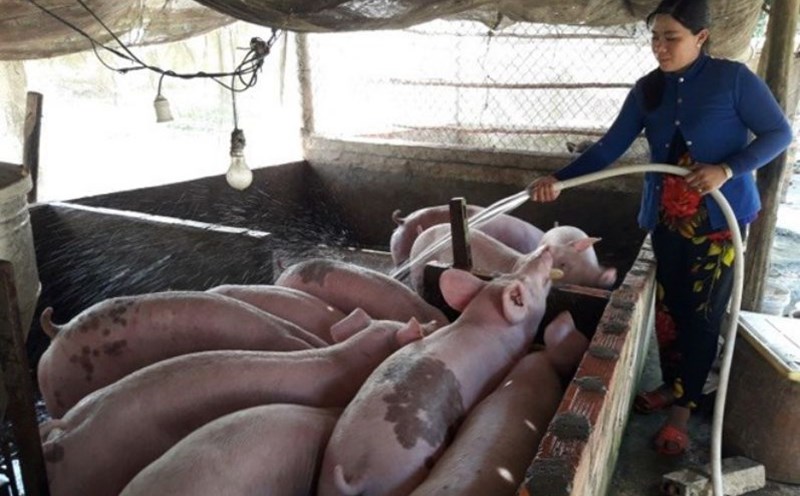Many families struggle because of the epidemic
African swine fever (DTLCP) is complicated in Quang Tri, especially in small-scale livestock households. Unstable weather, reduced livestock resistance, combined with poor barn hygiene, caused the epidemic to spread rapidly.
In Trung Thuan commune, the authorities have destroyed nearly 1,400 pigs, with a total weight of nearly 63 tons. Ms. Doan Thi Huong, in Tam Da village, said that her family lost nearly 70 pigs, including 10 sows, 30 products about to be released from the cages and nearly 30 pigs.
Although the family disinfected, sprayed lime every day, and separated the herd when they discovered signs of illness, they still could not save the pigs. "There is a lot of medicine but the pigs still die, I hope the State will soon support funding to re-herd them," Ms. Huong said.
Vinh Thuy commune was also severely affected. According to Vice Chairman of the People's Committee of Nguyen Quang Chien commune, the whole commune had 512 households damaged, 1,766 pigs (nearly 113 tons) forced to be destroyed.
The family of Mr. Nguyen Van Thang, in Lam Cao village, lost nearly 300 million VND when the entire herd of more than 70 pigs tested positive for DTLCP virus.
"The barn is now empty, looking at it in pain. Hopefully the epidemic will pass quickly to re-arrange, because we have been in this profession for many years, Mr. Thang shared.
According to the provincial Department of Animal Husbandry and Veterinary Medicine, as of August 6, 2025, the epidemic had appeared in 4,495 households, in 434 villages of 49 communes and wards. The total number of pigs that were sick, died, and forced to be destroyed was 30,243, weighing more than 1,802 tons. Currently, only Dan Hoa commune has not had a new epidemic for 21 days, the remaining 48 communes have not had a new epidemic for 21 days.
Tightening slaughter control
Mr. Duong Viet Phuong Tuan - Deputy Head of the Provincial Department of Animal Husbandry and Veterinary Medicine said that every day, thousands of pigs must be destroyed. Localities have urgently disinfected, disinfected, instructed livestock farmers to care for uninfected pigs, strictly prohibited the sale, slaughter or dumping pig carcasses into the environment.
However, slaughter control at small-scale facilities is still left open. Many communes and wards have not arranged veterinary staff to monitor, leading to the risk of spreading the epidemic and food safety problems.
To overcome this, the Department has directed stations to strengthen slaughter control, strictly prohibit the placing of control seals at points that are not in accordance with regulations; require strict inspection before and after slaughter; officers who violate will be responsible before the law.
Previously, as Lao Dong Newspaper reported, the situation of dead pigs being thrown into rivers and streams appeared in many localities in the province.
The peak was on August 1, in Dong Trach commune, the authorities discovered about 50 dead pigs floating in the canals, forcing them to collect and bury them according to regulations to prevent the risk of disease.











